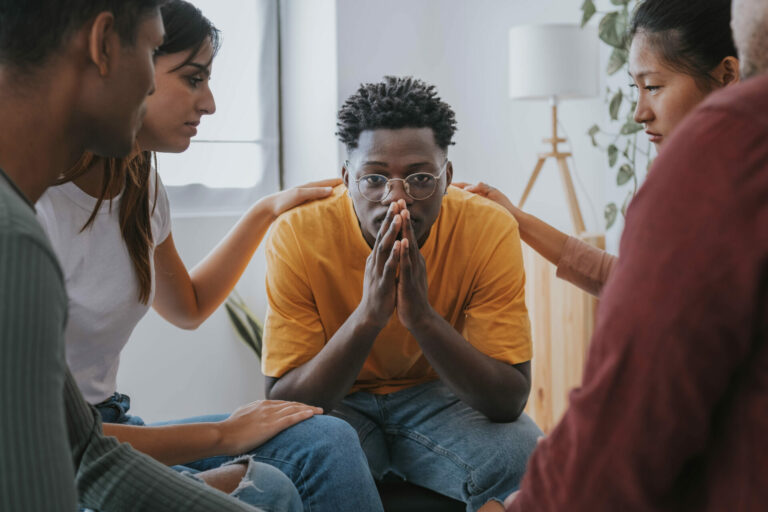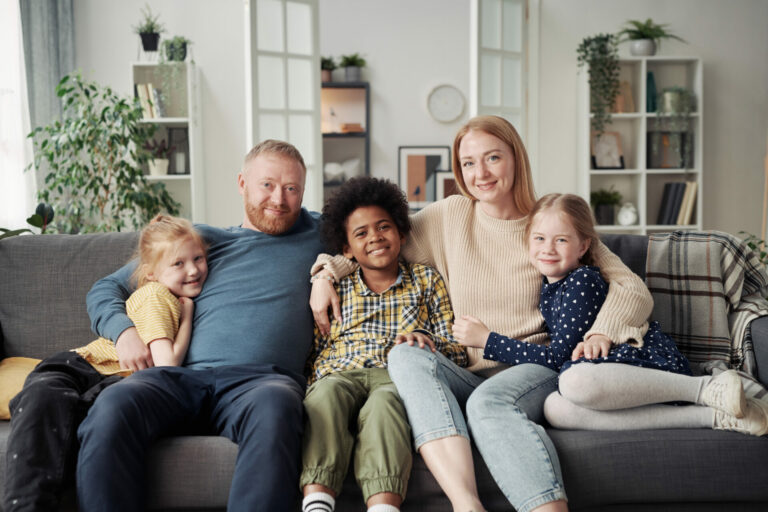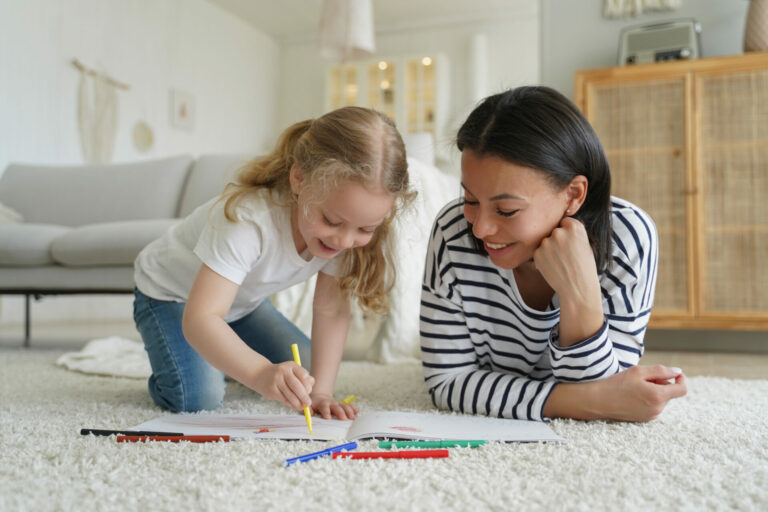Taking a break is a simple, one-step strategy for self-regulation. With a little preparation and planning, it can be a skill that a person can easily access. What about when that person is a parent, though? How does a parent take a break? Is it ever okay for a parent to step away? If so, how? When? If the parent steps away, will it harm a child? As with many situations, the answer is, “it depends.” There are some basic principles to apply when parents take breaks.
First of all, is it okay for parents to take breaks? Yes, of course! Breaks are beneficial for the self-regulation of all individuals (Ackerman, 2018). Taking a break as a parent might look different from an adult without children taking a break. Parents might have to take a break while staying near their children. Parents might have to take a break by grounding their feet outside, with their children (Your Therapy Source, n.d.). Parents might take a break by listening to a song, while staying with children. Parents might have to learn to practice mindfulness, even in the loud and crazy moments. Sometimes, though, taking a break in the moment does not work. What then?
Parents may sometimes need a break apart from children. They might need to ask another adult to take the children so the adult can have a few moments alone to ground and re-regulate (Cupo, n.d.). A parent might have to get creative about where to take a break, especially if they need a break from the sensory stimuli of child noise. They might need to go sit in the bathroom on the far side of the house, or take a walk outside in the neighborhood (Race, n.d.). Is this escaping? Maybe for a little while, but if the result is a well-regulated adult who can then co-regulate with kids who have big feelings, it seems like the escape is worthwhile.
What about time-in versus time-out? Could parents wound the child’s psyche by taking a break from the child physically? It depends on how the parent leaves. Does the parent leave in a huff with angry words said towards the child, or does the parent, as well as the parent can, tell the child that the parent has big feelings and needs a break? The former could cause a child to think that the parent is leaving because of them. The latter models for the child what it looks like to own big feelings and cope in healthy ways. A parent taking a time-out to cope with his or her feelings is also different from giving a child a time-out. This is often discouraged, especially in the case of foster care and adoption (Heid, 2019). Discouraging administration of time-outs to children is based on the idea that time-outs teach children to isolate when they are struggling (Siegel & Bryson, 2014). This is not what parents want, as parents want to connect and co-regulate their kids. Even so, research has yet to definitively show that time-outs for children have long-term negative effects.
Adult breaks could also have positive effects on children when done properly. Adults can use their breaks as opportunities to express love to children both as they leave, and as they come back (Soderlund, n.d.). This can help develop departure and arrival rituals (Cedar, 2022). Parent breaks can also help develop object permanence, the idea that the parent still exists, even if not in direct sight (Cherry, 2021). Parent breaks can help internalize attachment with the parent through an internal working model (Li, 2022). Internal working models could benefit the child in the long run.
Should parents take breaks? Yes, definitely. Should parents always take breaks away from children? No, probably not. As with all things, time-outs for parents are nuanced. Still, parents should be able to consider a break apart from their children as an option, without a heaping side of guilt. There are ways to make breaks apart from children work. Parents just have to work at it, just like they work at co-regulating to help their little ones develop their own internal self-regulation.
Every behavior makes sense in context, but that does not mean every behavior is okay. This is a subtle, but important difference. In a world that increasingly (and often rightly so) recognizes victims and makes restitution towards them, there is also a place for personal responsibility.
Taking a break is a simple, one-step strategy for self-regulation. With a little preparation and planning, it can be a skill that a person can easily access. What about when that person is a parent, though? How does a parent take a break? Is it ever okay for a parent to step away? If so, how? When? If the parent steps away, will it harm a child? As with many situations, the answer is, “it depends.” There are some basic principles to apply when parents take breaks.
First of all, is it okay for parents to take breaks? Yes, of course! Breaks are beneficial for the self-regulation of all individuals (Ackerman, 2018). Taking a break as a parent might look different from an adult without children taking a break. Parents might have to take a break while staying near their children. Parents might have to take a break by grounding their feet outside, with their children (Your Therapy Source, n.d.). Parents might take a break by listening to a song, while staying with children. Parents might have to learn to practice mindfulness, even in the loud and crazy moments. Sometimes, though, taking a break in the moment does not work. What then?
Parents may sometimes need a break apart from children. They might need to ask another adult to take the children so the adult can have a few moments alone to ground and re-regulate (Cupo, n.d.). A parent might have to get creative about where to take a break, especially if they need a break from the sensory stimuli of child noise. They might need to go sit in the bathroom on the far side of the house, or take a walk outside in the neighborhood (Race, n.d.). Is this escaping? Maybe for a little while, but if the result is a well-regulated adult who can then co-regulate with kids who have big feelings, it seems like the escape is worthwhile.
What about time-in versus time-out? Could parents wound the child’s psyche by taking a break from the child physically? It depends on how the parent leaves. Does the parent leave in a huff with angry words said towards the child, or does the parent, as well as the parent can, tell the child that the parent has big feelings and needs a break? The former could cause a child to think that the parent is leaving because of them. The latter models for the child what it looks like to own big feelings and cope in healthy ways. A parent taking a time-out to cope with his or her feelings is also different from giving a child a time-out. This is often discouraged, especially in the case of foster care and adoption (Heid, 2019). Discouraging administration of time-outs to children is based on the idea that time-outs teach children to isolate when they are struggling (Siegel & Bryson, 2014). This is not what parents want, as parents want to connect and co-regulate their kids. Even so, research has yet to definitively show that time-outs for children have long-term negative effects.
Adult breaks could also have positive effects on children when done properly. Adults can use their breaks as opportunities to express love to children both as they leave, and as they come back (Soderlund, n.d.). This can help develop departure and arrival rituals (Cedar, 2022). Parent breaks can also help develop object permanence, the idea that the parent still exists, even if not in direct sight (Cherry, 2021). Parent breaks can help internalize attachment with the parent through an internal working model (Li, 2022). Internal working models could benefit the child in the long run.
Should parents take breaks? Yes, definitely. Should parents always take breaks away from children? No, probably not. As with all things, time-outs for parents are nuanced. Still, parents should be able to consider a break apart from their children as an option, without a heaping side of guilt. There are ways to make breaks apart from children work. Parents just have to work at it, just like they work at co-regulating to help their little ones develop their own internal self-regulation.
Every behavior makes sense in context, but that does not mean every behavior is okay. This is a subtle, but important difference. In a world that increasingly (and often rightly so) recognizes victims and makes restitution towards them, there is also a place for personal responsibility.
References
Ackerman, C. (2018, July 3). What is self-regulation? (+95 skills and strategies). Positive psychology.
Ceder, J. (2022, June 26). The importance of saying goodbye to your child. Very well family.
Cherry, K. (2021, April 24). What is object permanence. Very well mind.
Cupo, A. (n.d.). The parent timeout: What to do when your emotions are out of control. Stepping forward counseling center.
Heid, M. (2019, October 15). Are time-outs harmful to kids? The latest research says otherwise. Time.
Li, P. (2022, June 28). What is the internal working model of attachment | Psychology. Parenting for the Brain.
Race, K. (n.d.). Parents need time-outs too: 4 simple steps to help you calm down in the moment. Mindful life.
Siegel, D.J., & Bryson, T.P. ‘Time-outs’ are hurting your child. Time.
Soderlund, A. Time-out vs. Time-In: Is there a better way? Why you need the flexibility of a feeling-break. Nuture and thrive.
Your Therapy Source. (n.d.). Emotional regulation for adults.
References
Ackerman, C. (2018, July 3). What is self-regulation? (+95 skills and strategies). Positive psychology.
Ceder, J. (2022, June 26). The importance of saying goodbye to your child. Very well family.
Cherry, K. (2021, April 24). What is object permanence. Very well mind.
Cupo, A. (n.d.). The parent timeout: What to do when your emotions are out of control. Stepping forward counseling center.
Heid, M. (2019, October 15). Are time-outs harmful to kids? The latest research says otherwise. Time.
Li, P. (2022, June 28). What is the internal working model of attachment | Psychology. Parenting for the Brain.
Race, K. (n.d.). Parents need time-outs too: 4 simple steps to help you calm down in the moment. Mindful life.
Siegel, D.J., & Bryson, T.P. ‘Time-outs’ are hurting your child. Time.
Soderlund, A. Time-out vs. Time-In: Is there a better way? Why you need the flexibility of a feeling-break. Nuture and thrive.
Your Therapy Source. (n.d.). Emotional regulation for adults.




